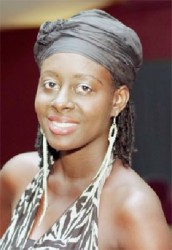As a child Mosa Telford struggled with the colour of her skin since her dark complexion resulted in her peers teasing her mercilessly and she never felt that she was good enough.
“Growing up as a dark-skinned girl, I had many challenges, because you know when you are growing up a lot of people would have something bad to say about your complexion, so when I was growing up as a child I never felt that I was good enough, I never felt beautiful, I felt like something was wrong with my colour because

you go to school [and] you get teased by other children and even some adults would say stuff,” Telford told the Sunday Stabroek in a recent interview.
All that changed when she started to read more in her late teens about her culture via the books left by her late grandfather, but while she could overcome the cruel remarks and the feeling that she was not ‘good enough’ it was still an experience she did not forget, and she always wanted to address the issue and its effects.
And so when she wrote a play titled Sauda ‒ one of the many she has written ‒ she addressed the issue, and that was the play which won the Drama category of the Guyana Prize for Literature Awards 2012 for the 30-year-old Buxtonian, beating out the more tried and tested Harold Bascom.
The play came about following a dream she had ‒ most of her plays are inspired by dreams ‒ and it took eight months to complete. The drama deals with teenage pregnancy and ‘colourism.’
It was the first time the young mother had entered the competition but even when she was a child she knew that writing was the path her career would take, and after she was told when she was about 14 by Eusi Kwayana that she would one day become a writer, there was no turning back.
“When I entered, as the months went by I kept saying to myself if I make the shortlist at least I would have accomplished something…” Telford told the Sunday Stabroek days after she had won the prize, adding that she knew that Bascom was the person to beat since he had won three times before.
When she saw that the two of them had been shortlisted she thought, “even if I didn’t get the prize I would have lost to someone of his calibre.”
“But when I got the information that I had won it was amazing, it was like a ‘wow’ feeling, I couldn’t believe it really…” she said.
‘Naturally’
“Writing came naturally to me; I started writing as far back as age seven and I think it is probably in my genes, because my father was also involved in creative writing… and it was just something that came to me,” she said, going on to explain that Kwayana’s prediction was made while she was taking classes from him and if there was ever a confidence booster, that was it.
It was then that she made the decision that writing was what she wanted to do in life.
Her win might very well have to do with the fact that she is one of her biggest critics, as she said that she always reviewed her own work, feeling that it was not good enough and that she should strive for better.
“I would put so much pressure on myself; I think I am my biggest critic. So winning the prize…has not taken away that sort of feeling from me, but it has boosted my confidence [and] it has also inspired me to continue going at it, to continue to share the messages…”
 As a writer Telford always strives to bring about change through her work, which is why she focuses mainly on social issues in the hope that people who watch her plays or read one of her short stories would begin thinking about their part and ultimately change. She has written about child sexual abuse and domestic violence, among other things.
As a writer Telford always strives to bring about change through her work, which is why she focuses mainly on social issues in the hope that people who watch her plays or read one of her short stories would begin thinking about their part and ultimately change. She has written about child sexual abuse and domestic violence, among other things.
Following secondary school she started at the University of Guyana studying communication, but it was not what she wanted as she was more interested in the performing arts. In the end she did not complete the programme but she did get the opportunity to study in England where she completed a diploma in performing arts at a college.
“That was the best thing ever…studying what I wanted to do; it was really, really great,” she said. Returning to Guyana at age 21 she was at home for a while writing, but eventually got a job at the radio serial Merundoi as one of the writers, and has been there ever since.
Telford is of the opinion that if more workshops are held for young writers it would help them to hone their skills; she also feels that the University of Guyana should have a programme tailored for writers. As a member of the Theatre Guild, Telford said she has seen many young persons with the potential to become great writers should an enabling environment be there.
That being said, Telford said that if someone wants to make it in the industry they have to push themselves instead of sitting and waiting for things to happen. Sometimes you have to spend your own money to stage a play “because in order to make it you have to push yourself.” And while many persons have expressed the need to get out of Guyana it is not the same for Telford, who feels that by living in Guyana you are aware of what the environment is and what should be done. Travelling to another country such as the US, however, which is much bigger and where the competition is so much greater, it would be difficult. In the end, she noted, many people would have to forget about their creative passion and turn to something else.
“For me I am just trying to build a stronger foundation here…and even if I go overseas some time I still would be doing stuff.”
Asked about what needs to be done to get more young people involved in what is happening in their country, Telford noted that many young persons are living from day to day instead of really focusing on what is happening and the future.
“You see a lot of young people [and] for the most part I don’t think they have a long-term vision…” Some of this can be excused, she remarked, for upon completion of studies at UG some are hard pressed to find a job.
For her part Telford said she will continue to write and that as a young mother she does not find it difficult to work as she does it from home and it is her passion, so she manages. While she has written many plays she has only staged five so far.
Telford is also part of CineGuyana, the Film Production Company of Guyana, and she hopes to become more involved in film-making in the coming years. She co-wrote one script with another creative writer, Kojo McPherson, and subsequently wrote a second one. She also hopes to start a web-series of very short films that would be uploaded on YouTube targeting Guyanese in the diaspora. A book of short stories has been in the works for some time, and Telford said she hopes that it will be published soon.




